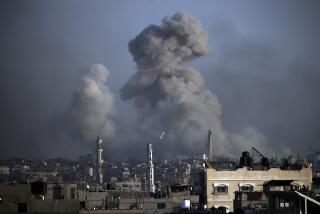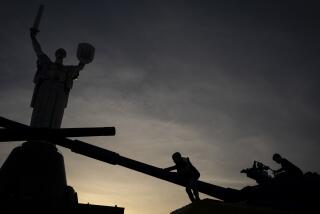Iraq and U.S. Face Difficult, Decisive Time
- Share via
WASHINGTON — President Bush declared Friday that the Iraqi people faced a “moment of choosing” as his administration weighed whether its policies and the U.S. military are sufficient to avert a weak ally’s descent into civil war.
In a somber speech to military veterans, Bush said the coming days would be “difficult and exhausting” because of the sectarian fury unleashed by the bombing of a Shiite shrine. But he insisted that the situation holds reason for optimism because Iraqis “want their freedom.”
Although Iraq appeared to be calmer Friday under a strict curfew, administration officials and outside analysts said the upheaval had demonstrated the dearth of options and limits on American power there.
The violence made it clear that the Americans’ ultimate tool -- U.S. military forces -- would be of little value in the event of all-out civil war because of the difficulty of using Americans to separate Shiites and Sunnis in a battle.
“When it’s a fight of Iraqi Shia on Sunnis, our guys can’t get in the middle,” said one senior U.S. official, who spoke on condition of anonymity because he was not authorized to comment. “It would all be up to the Iraqis.”
Two years ago, when the insurgency flared throughout Iraq, the U.S. military strategy was clear: Dispatch troops to the trouble spots, launch major offensives in Iraq’s cities and delay the planned departure of several U.S. brigades to bulk up troop strength.
This time, the approach has been far different. Commanders in Iraq have been determined to keep U.S. troops away from ethnic demonstrations and violent clashes to avoid provoking anger among Sunni and Shiite Iraqis.
Army Col. Jeffrey J. Snow, who commands the 1st Brigade of the 10th Mountain Division based in western Baghdad, said the commanders want Iraqi soldiers and policemen, rather than U.S. troops, to patrol the streets and intercede to quell the violence.
“If we rapidly mass on a particular area, we could incite an incident. And we’re careful not to do that,” said Snow, who spoke Friday by teleconference to reporters at the Pentagon.
Because of that sensitivity, the American military largely watched the violence from the sidelines over the last several days. And as a result, the success of the central project of Bush’s presidency may no longer be in the administration’s hands.
“This is extremely serious,” said one Defense official who makes frequent trips to Iraq and who spoke on condition of anonymity because of agency rules.
“Whereas previous insurgent activity has mostly been aimed at making parts of Iraq ungovernable, this has split the government. And it significantly weakens the government.”
The violence raised doubts about whether U.S. leaders will be willing or able to continue reducing the number of U.S. troops in Iraq this year. At the same time, some U.S. officials and congressional aides pointed out that continuing strife could convince Congress and the American public that U.S. troops shouldn’t be embroiled in a civil war.
A breakout of full civil war “could make a lot of Americans say, ‘A plague on both your houses,’ ” the senior U.S. official said. Some U.S. officials argued Friday that in the last two days, the Iraqi troops showed how much their capabilities had grown as they gradually clamped down on the violence.
But the week’s developments also showed how far the security forces are from the goals American officials have set. U.S. officials still have far to go to disentangle Iraq’s security forces from sectarian militias. Rather than suppressing the violence when it first began, some militia members cheered on the attackers or took part in the violence.
A second U.S. official said that the ineffectiveness of some Iraqi units after Wednesday’s bomb attack on the Shiite shrine in Samarra should not have been cause for surprise.
“You’re asking these largely Shia security forces to fire on other Shia, when they’re probably angry about it themselves,” said the official, who also was not authorized to speak publicly. “That’s asking a lot.”
The greatest danger during the current situation is that sectarian strife might cause Iraqi units to disintegrate, with Iraqi soldiers and policemen abandoning their posts to join Sunni or Shia militias and fight each other, said Michael Rubin. A former Pentagon official and a onetime U.S. advisor in Iraq, Rubin is now at the American Enterprise Institute, a Washington think tank.
“When the Iraqi army fractures, that’s when we really have to worry,” Rubin said. “I’m holding my breath.”
So far, that has not happened. U.S. officials struggled -- and ultimately succeeded -- in their effort to convince Iraqi leaders to come together to appeal for calm.
However, American officials acknowledged that figures such as the Shiite leaders Abdelaziz Hakim and Muqtada Sadr joined the appeal not because of U.S. pressure but because they concluded that as political stakeholders, peace was in their own interest.
As U.S. officials confronted the immediate crisis, they also grappled with the challenge it posed to the three-pronged American strategy of shoring up Iraq’s economy, its military and its political system.
The Bush administration is winding down its economic reconstruction plan but has redoubled efforts to train Iraq’s security forces. The administration has also touted advances in the formation of a new government.
On Friday, however, Secretary of State Condoleezza Rice acknowledged to reporters that the explosion of violence “makes it harder today and perhaps tomorrow” to form a new, permanent government. She insisted, however, that the country’s political leaders would “get back to that process very shortly.”
Other officials acknowledged that the majority Shiites are now much less likely to give control of key security posts in the Interior and Defense ministries to other groups, as the Americans have been pushing them to do. U.S. officials oppose the presence of Iraqi officials with ties to the militias at the heads of critically important ministries.
But the second U.S. official said it had become “very likely” that the Shiites would dig in their heels on that issue.
“This may be the most tangible result of all this,” he said.
The CIA and other U.S. intelligence agencies have been monitoring the reactions of factions across Iraq in an effort to gauge the danger that the country could tumble into civil war.
The bombing of the shrine, the Golden Mosque, and subsequent attacks are “definitely seen as a serious challenge to the unity of Iraq, and it is a serious test for the government and not just its security apparatus, but in some ways the society itself,” one U.S. intelligence official said.
The official added that U.S. agencies believe that militant leader Abu Musab Zarqawi’s organization was behind the bombing.
“I have not heard a definitive judgment on that,” said the intelligence official, who spoke on condition of anonymity because of government rules. “But it is certainly consistent with their choice of targets and overall kind of objectives -- to stir up intercommunal strife and to attack the Shia.”
The official said U.S. intelligence agencies were paying close attention to the tone of Friday prayer sessions in mosques around the country, and that analysts saw some encouraging signs.
“There have been voices on both sides, Sunni and Shia, calling for restraint,” the official said.
More to Read
Sign up for Essential California
The most important California stories and recommendations in your inbox every morning.
You may occasionally receive promotional content from the Los Angeles Times.














